- Home
- slideshows
- miscellaneous
- China is repressing an ethnic Muslim minority on an unprecedented scale - here are their excuses for imprisoning people
China is repressing an ethnic Muslim minority on an unprecedented scale - here are their excuses for imprisoning people
Setting clocks to two hours after Beijing time.

Using a VPN to do homework.
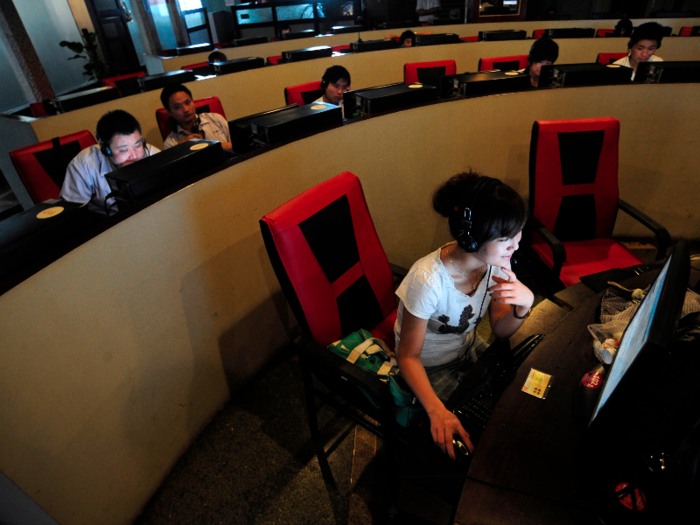
A woman identified by the pseudonym Sofia said her daughter, a college student studying outside of China, got detained for using a virtual private network (VPN) to bypass China's strict firewall to do her homework during a visit to Xinjiang.
The daughter was "visiting relatives [in Xinjiang] and needed to access her school’s website for homework ... and [she] used a VPN," Sofia said.
"But throughout my daughter's detention, they never told us why they were holding her. I only knew about the VPN after my ex-husband made enquiries about why she wad detained and those [who knew] told him."
Read more: China's 'Great Firewall' is taller than ever under 'president-for-life' Xi Jinping
Showing distinct markers of Islam, like having a beard or wearing a veil.
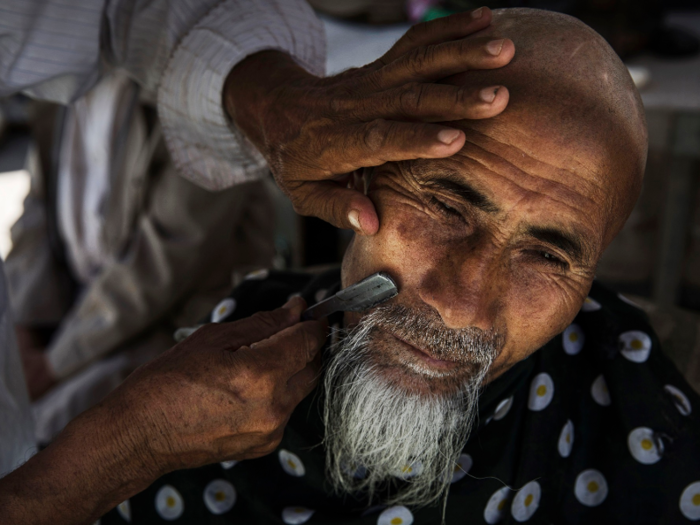
China has prohibited the distinct markers of Islam, such as growing long beards and wearing veils in public, since at least 2017.
Erkin, a Uighur who was previously held in a political education camp, confirmed to Human Rights Watch that not following those rules is a cause for detention.
"There was an [ethnic] Uighur, who was our leader" in the detention camp cell, Erkin said. "He'd been detained for having a beard."
A 23-year-old Muslim Uighur, identified by the pseudonym Guli, also told The Guardian that she was interrogated by local authorities because they heard reports that she wore a hijab and prayed. She was later sent to a detention center for eight days, although her charge is not clear.
While detained Guli added that she had met a woman was imprisoned because police found a message saying "Happy Eid" on her phone.
Exhibiting Muslim behaviours and practices, such as not serving alcohol in restaurants.
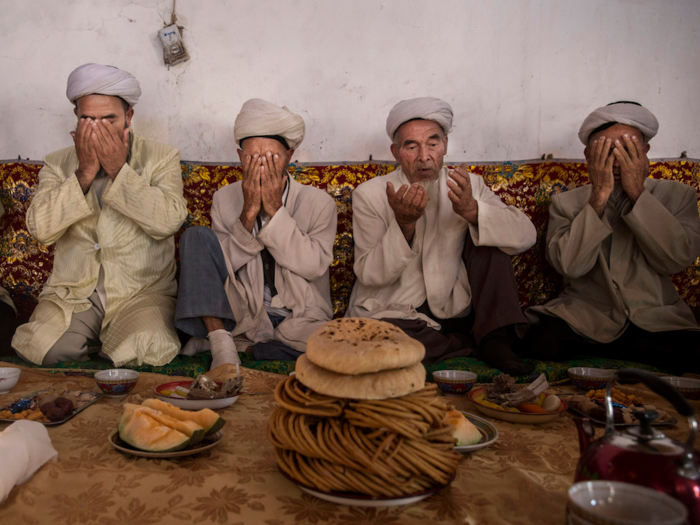
Erkin, the former detainee, told Human Rights Watch: "I know three restaurant owners [who] ran 'Islamic' restaurants — they got detained because they don't allow smoking or drinking in their restaurants."
Another Uighur who had been detained, identified by the pseudonym Nur, told the rights group that he met a man who got locked up because "because he told his neighbor that they shouldn't drink because they are Muslims."
That incident got reported to the local shequ — or neighborhood authority — which ultimately resulted in the man's arrest and detention, Nur said. It's not clear who made the report.
Chinese officials often urge villagers to investigate and inform on their relatives, friends, and neighbors, The New York Times reported, citing government reports.
Going to religious gatherings.

Hoshur, a Uighur man from southern Xinjiang, told Human Rights Watch that his mother and other elderly women were detained for attending a religious memorial service five years ago.
He said:
"My mother was arrested [in March 2018]. According to information from my family, she's in a detention center and [was] charged with 'attending a religious gathering' at our neighbors'.
"When my neighbor passed away, women gathered at the neighbor's house, maybe they cited the Quran ... the gathering happened in 2013.
"About 20 elderly women in their 60s were arrested by the authorities."
Sharing digital files of Islamic religious teachings.
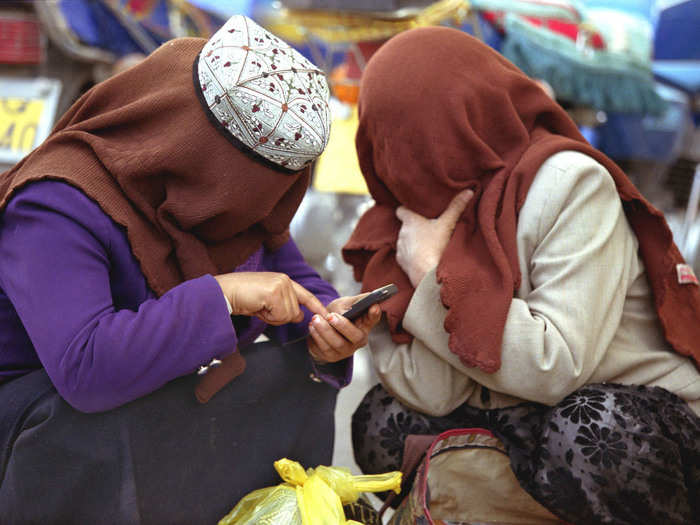
A former detainee, identified by the pseudonym Alim, described meeting a 60-year-old and his daughter who were imprisoned for sending audios of Islamic teachings to other people.
He told Human Rights Watch the 60-year-old "had sent a tabligh audio — it is a form of Islamic religious teachings — to his daughter, and his daughter passed it to a friend.
"He got six years and his daughter got three years."
Owning computer files to do with Islam or in the Uighur language.
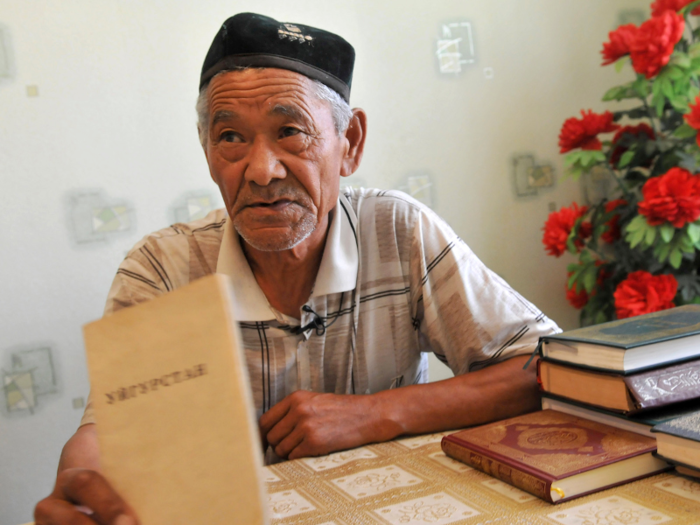
Alim told Human Rights Watch: "There was a guy who got [convicted and imprisoned for] eight years — he said he had some e-books in Uighur and he said the police counted that as religious materials."
China has also been burning bibles and shutting down churches as part of a drive to make sure everyone in the country is loyal to the atheist Communist Party before anything else, the Associated Press reported.
Traveling out of the region.

A 42-year-old Uighur woman, identified by the pseudonym Medina, told Human Rights Watch her husband had been sent to a political education camp for traveling abroad. She did not specify which country.
She told Human Rights Watch in May: "I can understand if [my husband] did something wrong and he is punished, but he didn't do anything.
"My husband's cousin's brother has also been detained... for going to Malaysia as a tourist. Just for that, he's been detained."
Some Uighurs also reported having to obtain official approval prior to their travels.
A Uighur who left Xinjiang as a teenager last year, identified by the pseudonym Omerjan, also said: "We had to go to the neighborhood office to sign various papers saying that we won't participate in any religious activities and afterwards we were allowed 10 days away from the country."
Chinese Muslims embarking on Hajj, the annual pilgrimage to Mecca, were also photographed wearing GPS trackers around their necks as they prepared for their journey earlier this year.
Knowing people who had traveled out the region.

The man identified as Nur, who had been locked up by authorities, reported meeting fellow detainees who were held just for knowing people who had left the country.
He told Human Rights Watch: "I met people who ... have friends who have gone to Australia or Turkey or [places] outside China.
"It's not even that they have close relatives abroad. Having friends or neighbors who have gone abroad" was enough to get detained, he said.
Communicating with people outside the country via WhatsApp.

Omerjan, who left Xinjiang as a teenager last year, said he sent a greeting to his father via WhatsApp — which got his father taken into interrogation.
"I downloaded WhatsApp on my father's phone when he was here [in a foreign country] and I wanted to check if he can use WhatsApp over there [in Xinjiang], so I sent him a message," he told Human Rights Watch. "After he received it, he was taken away."
"I didn't even say anything, I just sent a greeting. He was taken away for a day, during which they asked him all kinds of questions about his WhatsApp."
Using WhatsApp — a foreign messaging service — also appears to be a crime in itself.
Medina, who said her husband was detained for traveling abroad, also said authorities "found WhatsApp on his phone and they accused him of speaking to someone [in a foreign country] through WhatsApp."
The predominant messaging app in China is WeChat. Chinese authorities can monitor private messages on the app without asking for permission.
Planning a move out of the country.

A woman whose husband and three children were sent to political camps, who was given the pseudonym Enlik, said authorities had checked her husband's phone messages, and detained him for discussing the possibility of moving out of China.
"Police came and checked my husband's phone and they found that he's been discussing the possibility of migrating to [a foreign country]," she told Human Rights Watch.
"And they said: 'Why are you talking about moving to [that foreign country]?'
"Fifteen days later they took him to the political education camp.
"He's not a criminal, but how come he's detained just for talking about [a foreign country]?"
Visiting one of 26 'sensitive countries'
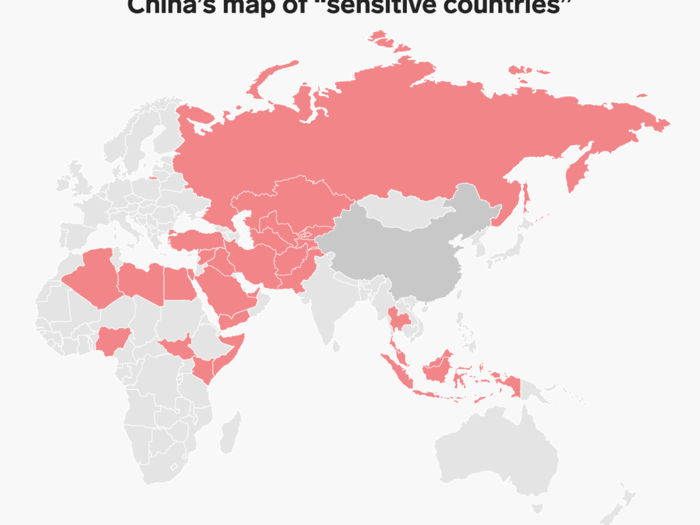
In fact, China has a list of 26 "sensitive countries" that Xinjiang residents can be punished for having ties with. All of them are either majority-Muslim or have large Muslim populations.
The countries are: Afghanistan, Algeria, Azerbaijan, Egypt, Indonesia, Iran, Iraq, Kazakhstan, Kenya, Kyrgyzstan, Libya, Malaysia, Nigeria, Pakistan, Russia, Saudi Arabia, Somalia, South Sudan, Syria, Tajikistan, Thailand, Turkey, Turkmenistan, United Arab Emirates, Uzbekistan, and Yemen.
Attempting suicide while in detention.

A former detainee, who was given the pseudonym Ehmet, said he tried to kill himself while being detained and was given seven extra years of imprisonment for attempting suicide.
He told Human Rights Watch:
"I hit my head on the wall and I had the feeling of powerless, helpless, and rage. I lost consciousness and when I woke up I was in a doctor's room. They had taken to me to a hospital.
"So, they examined me and said my head was seriously injured. The guard said: 'We're going to sentence you for another seven years for having attempted suicide.'
"I wailed."
China has repeatedly denied operating "re-education camps," but acknowledged that it had "resettlement" programs for people it considered terrorists.
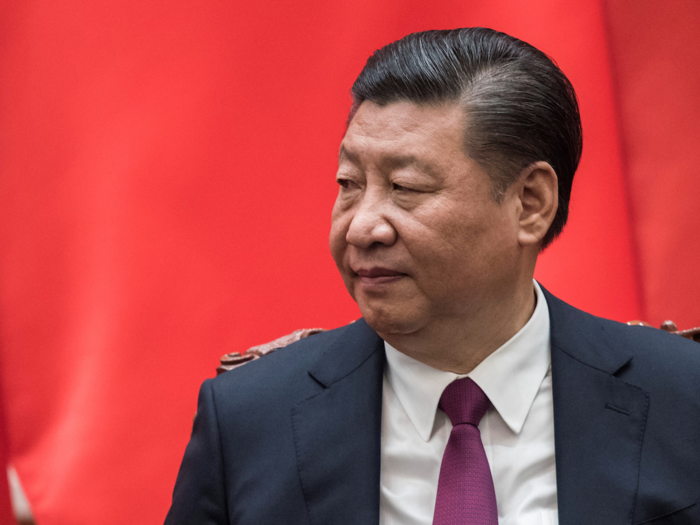
Earlier this week China told the UN's human rights chief, Michelle Bachelet, to "respect China's sovereignty" after she called on it to allow international monitors into Xinjiang.
Popular Right Now
Popular Keywords
Advertisement